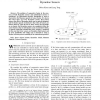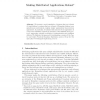148 search results - page 5 / 30 » Self-stabilization of Byzantine Protocols |
CORR
2011
Springer
13 years 4 months ago
2011
Springer
Self-stabilization is a versatile approach to fault-tolerance since it permits a distributed system to recover from any transient fault that arbitrarily corrupts the contents of a...
CORR
2006
Springer
13 years 9 months ago
2006
Springer
In this paper, we present a Byzantine fault tolerant distributed commit protocol for transactions running over untrusted networks. The traditional two-phase commit protocol is enh...
SSS
2005
Springer
14 years 3 months ago
2005
Springer
Awareness of the need for robustness in distributed systems increases as distributed systems become integral parts of day-to-day systems. Self-stabilizing while tolerating ongoing ...
CORR
2006
Springer
13 years 9 months ago
2006
Springer
Abstract-- The problem of cooperative fusion in the presence of both Byzantine sensors and misinformed sensors is considered. An information theoretic formulation is used to charac...
OPODIS
2007
13 years 11 months ago
2007
We present a novel translation of systems that are tolerant of crash failures to systems that are tolerant of Byzantine failures in an asynchronous environment, making weaker assum...


